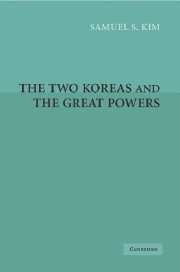
-
Select format
-
- Publisher:
- Cambridge University Press
- Publication date:
- June 2009
- June 2006
- ISBN:
- 9780511510496
- 9780521660631
- 9780521668996
- Dimensions:
- (228 x 152 mm)
- Weight & Pages:
- 0.79kg, 422 Pages
- Dimensions:
- (228 x 152 mm)
- Weight & Pages:
- 0.573kg, 422 Pages
You may already have access via personal or institutional login
Book description
This book explores Korea's place in terms of multiple levels and domains of interaction pertaining to foreign-policy behaviors and relations with the four regional/global powers (China, Russia, Japan, and the United States). The synergy of global transformations has now brought to an end Korea's proverbial identity and role as the helpless shrimp among whales, and both North Korea and South Korea have taken on new roles in the process of redefining and projecting their national identities. Synthetic national identity theory offers a useful perspective on change and continuity in Korea's turbulent relationships with the great powers over the years. Following a review of Korean diplomatic history and competing theoretical approaches, along with a synthetic national-identity theory as an alternative approach, one chapter each is devoted to how Korea relates to the four powers in turn, and the book concludes with a consideration of inter-Korean relations and potential reunification.
Reviews
"Kim has produced a work that is a must for undergraduate and graduate collections on Asia...Essential." -- Choice
"Kim's analysis is stimulating...well-worth reading...A valuable work of scholarship that will appeal to both Koreanists and non-specialists alike."
Timothy C. Lim, Pacific Affairs
Contents
Metrics
Altmetric attention score
Full text views
Full text views help Loading metrics...
Loading metrics...
* Views captured on Cambridge Core between #date#. This data will be updated every 24 hours.
Usage data cannot currently be displayed.
Accessibility standard: Unknown
Why this information is here
This section outlines the accessibility features of this content - including support for screen readers, full keyboard navigation and high-contrast display options. This may not be relevant for you.
Accessibility Information
Accessibility compliance for the PDF of this book is currently unknown and may be updated in the future.


